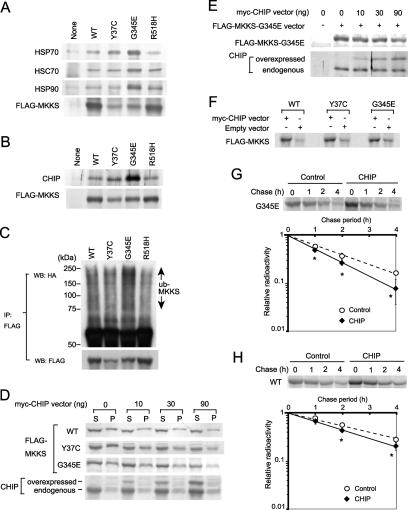Figure 6.
Increased association of CHIP with unstable MKKS mutants and effect of CHIP overexpression on their degradation. (A and B) FLAG-tagged Y37C (unstable and highly insoluble), G345E (unstable and rapidly degraded), or R518H (normal for degradation and solubility) mutants or wild-type MKKS as a control were transiently expressed in HEK293 cells. Cell lysates were immunoprecipitated with the anti-FLAG antibody and analyzed by Western blotting by using antibodies against molecular chaperones (A) or CHIP (B). Note that the amounts of Y37C and G345E mutants recovered by immunoprecipitation are much lower than those of the R518H mutant and wild-type MKKS due to rapid degradation. (C) Enhanced polyubiquitination of unstable MKKS mutants. Cells were cotransfected with ubiquitin-HA and FLAG-MKKS, and cell lysates were immunoprecipitated with the anti-FLAG antibody. Recovered FLAG-MKKS was analyzed by Western blotting by using antibodies against HA or FLAG. (D) CHIP overexpression reduces the amount of MKKS in both soluble and insoluble fractions. To stimulate MKKS aggregation, transfection efficiency was enhanced by transfecting cells with Effecten instead of FuGENE 6. After cotransfection with FLAG-MKKS (200 ng) and myc-CHIP (0–90 ng), cells lysates were fractionated by centrifugation and analyzed by Western blotting by using antibodies against FLAG or CHIP. (E) Overexpressed and endogenous CHIP proteins were associated with the G345E mutant. Cells were transfected with FLAG-MKKS-G345E as described in D, and FLAG-MKKS-G345E was immunoprecipitated. FLAG-MKKS-G345E and coprecipitated CHIP were analyzed by Western blotting. (F) MKKS synthesis is stimulated by CHIP overexpression. Cells transfected with FLAG-tagged wild-type or mutant MKKS were pulse labeled for 30 min in the presence or absence of CHIP overexpression. Labeled FLAG-MKKS proteins were analyzed by immunoprecipitation with the anti-FLAG antibody. (G and H) Effect of CHIP overexpression on the degradation of the G345E mutant and wild-type MKKS. Cells transiently expressing FLAG-tagged G345E mutant (G) or wild-type MKKS (H) under CHIP overexpression conditions were analyzed by pulse-chase experiments followed by immunoprecipitation. Radioactivity of FLAG-tagged MKKS bands in pulse-chase experiments was determined and normalized against the value of chase at 0 h (n = 3). Asterisks indicate significance of difference (p < 0.05).

